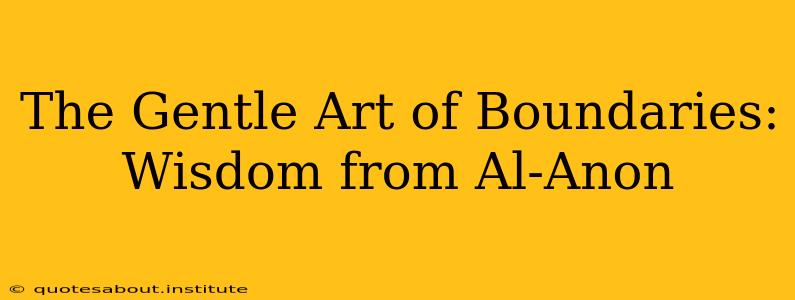The Gentle Art of Boundaries: Wisdom from Al-Anon
Al-Anon, a support group for friends and family members of alcoholics, offers invaluable wisdom that extends far beyond the realm of addiction. One of the most transformative concepts Al-Anon emphasizes is the importance of setting healthy boundaries. This isn't about being selfish or uncaring; it's about self-preservation and fostering healthier relationships. This article explores the gentle art of boundaries as taught by Al-Anon, providing practical strategies and insights to improve your relationships and overall well-being.
What are boundaries, and why are they important?
Boundaries are the limits we set to protect our physical, emotional, and mental health. They define what we are and are not willing to accept in our interactions with others. In the context of Al-Anon, boundaries are crucial for detaching with love from those exhibiting unhealthy behaviors, often associated with addiction. But these principles apply universally to any relationship where your well-being is compromised. Without clear boundaries, we risk burnout, resentment, and emotional distress. Setting boundaries is an act of self-respect and empowers you to prioritize your needs.
How does Al-Anon approach setting boundaries?
Al-Anon doesn't advocate for harsh confrontation. Instead, it emphasizes a gentle, yet firm approach based on self-awareness and assertive communication. The focus is on protecting yourself without causing unnecessary conflict. This involves understanding your own limits, communicating them clearly, and accepting the consequences of those limits—even if that means others may not like them.
How do I know if I need to set boundaries?
This is a crucial question, and Al-Anon suggests paying attention to the following signs:
- Feeling resentful, angry, or anxious frequently: Do you consistently find yourself stressed or emotionally drained after interacting with certain people?
- Ignoring your own needs: Are you constantly putting others' needs before your own, to the point of neglect?
- Feeling manipulated or controlled: Do you feel pressured into doing things you don't want to do?
- Experiencing physical symptoms like headaches, stomach aches, or sleeplessness: Chronic stress from unhealthy boundaries can manifest physically.
- Feeling guilty for saying "no": This often indicates a lack of established boundaries.
What are some practical ways to set boundaries according to Al-Anon principles?
Al-Anon emphasizes gradual, consistent implementation. Here are some practical tips:
- Identify your limits: Start by reflecting on your experiences. What behaviors or situations consistently drain you? What are you unwilling to tolerate anymore?
- Communicate your limits clearly and calmly: Use "I" statements to express your feelings without blaming others. For instance, "I feel overwhelmed when…" or "I need some space when…"
- Practice saying "no": This can be challenging initially, but it's crucial for protecting your energy and time.
- Enforce your boundaries consistently: This is key. If you don't consistently enforce your boundaries, they will lose their effectiveness.
- Be prepared for resistance: Not everyone will react positively to your newly set boundaries. Be prepared for pushback and remain firm in your decision.
- Seek support: Al-Anon meetings provide a safe and supportive environment to practice setting boundaries and receive feedback.
How can I set boundaries with an alcoholic or addict?
Setting boundaries with an addict requires careful consideration. The focus is less about controlling their behavior and more about protecting your own well-being. This might involve limiting contact, refusing to enable their addictive behaviors (e.g., lending money), or setting clear expectations for their behavior in your presence. Remember, your actions are about self-care, not punishment.
What if setting boundaries damages a relationship?
Setting healthy boundaries might strain or even end some relationships. While this can be painful, it's essential to remember that healthy relationships are built on mutual respect and the ability to maintain individual well-being. A relationship that demands you sacrifice your own well-being is ultimately unhealthy.
The wisdom of Al-Anon concerning boundaries offers a pathway to healthier relationships and a more fulfilling life. It's a process of self-discovery, assertive communication, and consistent self-care. By embracing the gentle art of boundaries, you empower yourself to prioritize your well-being and create a life where your needs are met. Remember, this isn't about being selfish; it's about self-preservation, and that's something worth striving for.

